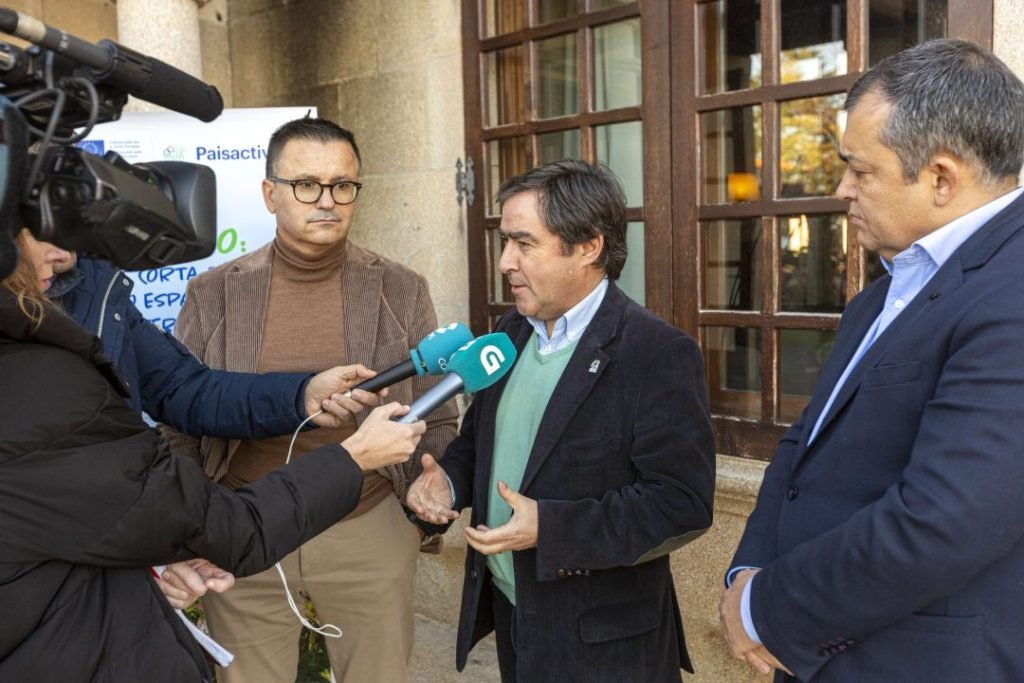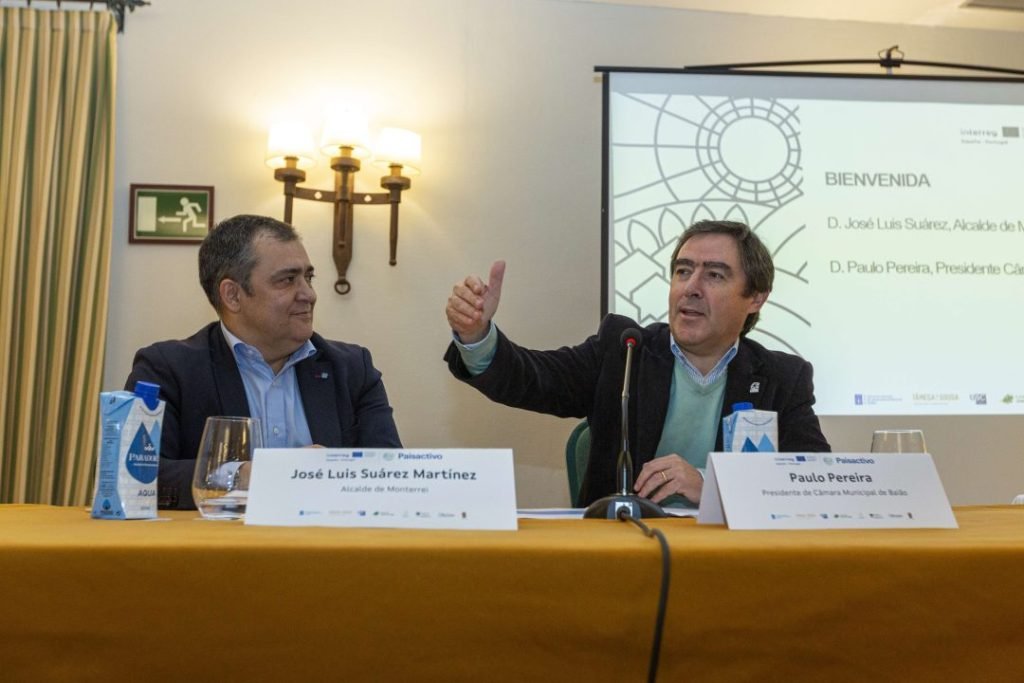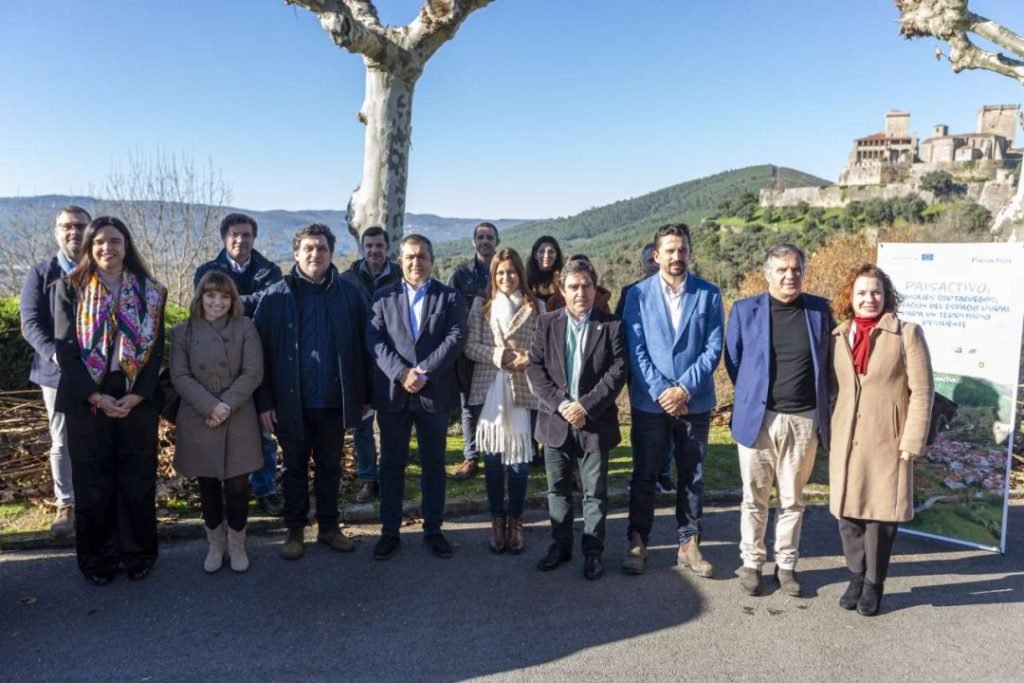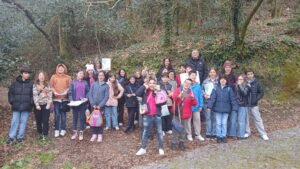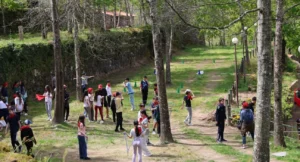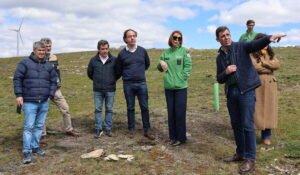The mayor of Baião, Paulo Pereira, took part on December 15 in Infesta, Monterrei,
Galicia, accompanied by technicians from the municipality, in the launch session of the
European project PAISACTIVO, aimed at sustainable land management and reducing
the risk of fires, which will have, among other actions, two pilot projects, one in the
village of Almofrela, in Baião, and the other in the Galician village of Infesta.
Involving an overall investment of 1.5 million euros, co-financed by POCTEC –
Operational Program for Cross-Border Cooperation between Spain and Portugal, the
project, which includes partnerships with the Municipality of Baião and the
Intermunicipal Community of Tâmega and Sousa (CIM-TS), foresees an investment of
around 250 thousand euros for the village of Almofrela, in the Campelo and Ovil Parish
Union.
“This is a project to enhance the territory, which is in line with the development
policies we are pursuing for our municipality, as part of a series of local and
regional actions aimed at preserving, promoting and developing Baião’s vast
natural heritage,” said the mayor in his speech.
The investment to be made in the village of Almofrela, as part of this project, is aimed
at preserving and boosting it, implementing actions aimed at resilience in the face of
forest fires, as well as infrastructural interventions aimed at its requalification and
beautification, promoting a stronger sense of belonging on the part of the local
community.
The Almofrela Hostel will also take on the role of the village’s Interpretive Center. Also
planned in the project, among other things, are urban arrangements around the Chapel
and the creation of a perimeter fire protection strip, where native trees will be planted.
The first secretary of the CIM do Tâmega e Sousa, Telmo Pinto, also took part in the
session, highlighting the lines of what has been the regional entity’s action in the
context of territorial promotion and the implementation of programs conducive to its
cohesion and the development of its potential.
In addition to the Tâmega e Sousa CIM and Baião City Council, the project includes six
other partners. On the Spanish side, the Galician Rural Development Agency
(AGADER), project leader, the University of Santiago de Compostela, the Juana de
Subscribe to DeepL Pro to edit this document.
Visit www.DeepL.com/pro for more information.
Vega Foundation, and the Municipality of Monterrei, and on the Portuguese side, the
Faculty of Letters of the University of Porto and the Directorate-General for Territory.
The session was also attended by the rural councillor of the Galician regional
government, José González Vázquez; the mayor of Monterrei, José Luis Suárez
Martínez; the director of the Galician Rural Development Agency, Inés Santé; the
deputy director of AGADER – International and Intelligent Rural Promotion, Jorge
Blanco Ballón, as well as other officials and leaders of the organizations involved in the
project.
The mayor of Baião, Paulo Pereira, took part on December 15 in Infesta, Monterrei,
Galicia, accompanied by technicians from the municipality, in the launch session of the
European project PAISACTIVO, aimed at sustainable land management and reducing
the risk of fires, which will have, among other actions, two pilot projects, one in the
village of Almofrela, in Baião, and the other in the Galician village of Infesta.
Involving an overall investment of 1.5 million euros, co-financed by POCTEC –
Operational Program for Cross-Border Cooperation between Spain and Portugal, the
project, which includes partnerships with the Municipality of Baião and the
Intermunicipal Community of Tâmega and Sousa (CIM-TS), foresees an investment of
around 250 thousand euros for the village of Almofrela, in the Campelo and Ovil Parish
Union.
“This is a project to enhance the territory, which is in line with the development
policies we are pursuing for our municipality, as part of a series of local and
regional actions aimed at preserving, promoting and developing Baião’s vast
natural heritage,” said the mayor in his speech.
The investment to be made in the village of Almofrela, as part of this project, is aimed
at preserving and boosting it, implementing actions aimed at resilience in the face of
forest fires, as well as infrastructural interventions aimed at its requalification and
beautification, promoting a stronger sense of belonging on the part of the local
community.
The Almofrela Hostel will also take on the role of the village’s Interpretive Center. Also
planned in the project, among other things, are urban arrangements around the Chapel
and the creation of a perimeter fire protection strip, where native trees will be planted.
The first secretary of the CIM do Tâmega e Sousa, Telmo Pinto, also took part in the
session, highlighting the lines of what has been the regional entity’s action in the
context of territorial promotion and the implementation of programs conducive to its
cohesion and the development of its potential.
In addition to the Tâmega e Sousa CIM and Baião City Council, the project includes six
other partners. On the Spanish side, the Galician Rural Development Agency
(AGADER), project leader, the University of Santiago de Compostela, the Juana de
Vega Foundation, and the Municipality of Monterrei, and on the Portuguese side, the
Faculty of Letters of the University of Porto and the Directorate-General for Territory.
The session was also attended by the rural councillor of the Galician regional
government, José González Vázquez; the mayor of Monterrei, José Luis Suárez
Martínez; the director of the Galician Rural Development Agency, Inés Santé; the
deputy director of AGADER – International and Intelligent Rural Promotion, Jorge
Blanco Ballón, as well as other officials and leaders of the organizations involved in the
project.
The mayor of Baião, Paulo Pereira, took part on December 15 in Infesta, Monterrei,
Galicia, accompanied by technicians from the municipality, in the launch session of the
European project PAISACTIVO, aimed at sustainable land management and reducing
the risk of fires, which will have, among other actions, two pilot projects, one in the
village of Almofrela, in Baião, and the other in the Galician village of Infesta.
Involving an overall investment of 1.5 million euros, co-financed by POCTEC –
Operational Program for Cross-Border Cooperation between Spain and Portugal, the
project, which includes partnerships with the Municipality of Baião and the
Intermunicipal Community of Tâmega and Sousa (CIM-TS), foresees an investment of
around 250 thousand euros for the village of Almofrela, in the Campelo and Ovil Parish
Union.
“This is a project to enhance the territory, which is in line with the development
policies we are pursuing for our municipality, as part of a series of local and
regional actions aimed at preserving, promoting and developing Baião’s vast
natural heritage,” said the mayor in his speech.
The investment to be made in the village of Almofrela, as part of this project, is aimed
at preserving and boosting it, implementing actions aimed at resilience in the face of
forest fires, as well as infrastructural interventions aimed at its requalification and
beautification, promoting a stronger sense of belonging on the part of the local
community.
The Almofrela Hostel will also take on the role of the village’s Interpretive Center. Also
planned in the project, among other things, are urban arrangements around the Chapel
and the creation of a perimeter fire protection strip, where native trees will be planted.
The first secretary of the CIM do Tâmega e Sousa, Telmo Pinto, also took part in the
session, highlighting the lines of what has been the regional entity’s action in the
context of territorial promotion and the implementation of programs conducive to its
cohesion and the development of its potential.
In addition to the Tâmega e Sousa CIM and Baião City Council, the project includes six
other partners. On the Spanish side, the Galician Rural Development Agency
(AGADER), the project leader, the University of Santiago de Compostela, the Juana de
Vega Foundation and the Municipality of Monterrei, and on the Portuguese side, the
Faculty of Letters of the University of Porto and the Directorate-General for Territory.
The session was also attended by the rural councillor of the Galician regional
government, José González Vázquez; the mayor of Monterrei, José Luis Suárez
Martínez; the director of the Galician Rural Development Agency, Inés Santé; the
deputy director of AGADER – International and Intelligent Rural Promotion, Jorge
Blanco Ballón, as well as other officials and leaders of the organizations involved in the
project.

